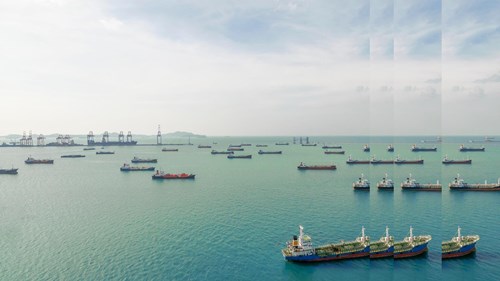Update: Second German Sanctions Enforcement Act enters into force
Following its publication in the Federal Law Gazette, the Second German Sanctions Enforcement Act’s (zweites Sanktionsdurchsetzungsgesetz - SDG II) most significant provisions entered into force on 28 December 2022. Information on the most important changes was contained in the draft bill prepared jointly by the Federal Ministry of Finance (BMF) and the Federal Ministry for Economic Affairs and Climate Action (BMWK). We discussed this in our previous news article. The Second German Sanctions Enforcement Act, which has now entered into force, builds on the First German Sanctions Enforcement Act (erstes Sanktionsdurchsetzungsgesetz – SDG I) of 28 May 2022. It aims to improve the enforcement of sanctions, especially given the sanctions imposed on Russia and the desire to combat money laundering. On the one hand, the Second German Sanctions Enforcement Act, which is an omnibus act, creates new federal law through the introduction of the Sanctions Enforcement Act (Sanktionsdurchsetzungsgesetz – SanktDG). On the other hand, it amends various existing German acts, including the Foreign Trade and Payments Act (Außenwirtschaftsgesetz – AWG ), the Anti-Money Laundering Act (Geldwäschegesetz – GwG), the Banking Act (Kreditwesengesetz – KWG) and the Securities Trading Act (Wertpapierhandelsgesetz – WpHG).
I. Important changes introduced by the Second German Sanctions Enforcement Act
- It creates a central authority responsible for enforcing sanctions at the federal level to enforce sanctions law in Germany.
- It establishes an administrative procedure for investigating the assets of sanctioned persons and partnerships and provides for a register for this purpose.
- It sets up a whistleblowing agency.
- It provides for the possibility of appointing a special representative to monitor compliance with sanctions in companies.
- It provides for the linking of real estate data to the transparency register.
- It creates a duty for organisations registered abroad that hold real estate in Germany to report their holdings to the transparency register.
- It introduces a ban on cash payments in real estate transactions.
- It increases the transparency of the concept of the deemed beneficial owner pursuant to section 3(2), fifth sentence of the German Anti-Money Laundering Act.
- It paves the way for authorities to be able to access information on ownership and control structures.
- It makes the UN’s sanctions list directly applicable in Germany.
- It amends the rules on trustworthiness in the legislation on financial supervision.
II. Changes compared to the draft bill
1. Sanctions Enforcement Act (SanktDG)
Sections 10(3) and (4) of the final version of the Sanctions Enforcement Act (new version) impose a duty on the Central Authority for Sanctions Enforcement and the other authorities involved in enforcement (such as the German federal bank - Deutsche Bundesbank) to report to one another following receipt of a relevant notification. In the draft bill, the reporting duty was only imposed on the central authority. In relation to the sanctioned assets register, the final version of the Act also increases the requirements placed on one of the three categories of the data to be collected. Previously, information on assets could be recorded if, after investigations into ownership had been completed, there was still a reasonable doubt as to the legal or beneficial ownership of the assets. Pursuant to section 14(1), point 3 of the Sanctions Enforcement Act (new version), it is now necessary for there to be, in addition, clear indications that the assets really are sanctioned assets and, in a volte-face from the approach taken in the draft bill, a reasonable doubt as to the legal or beneficial ownership of other persons is required. However, the newly drafted point 3 only applies to significant assets, i.e. those whose value exceeds €100,000, which is also a change. The new version of section 14(2) sets out detailed guidelines on the specific information that will be stored in relation to the relevant assets. Section 17(3) of the Sanctions Enforcement Act (new version), which was added to the final version of the Act, provides that the Central Authority for Sanctions Enforcement will now be responsible for proceedings involving administrative offences.
2. Additional laws
As compared with the draft bill, the final version that has now been published makes changes in relation to the provisions amending existing acts. In this context, special mention should be made of the notification requirement for notaries in the draft bill that was previously set forth in section 19c of the Anti-Money Laundering Act. The final version of the Second German Sanctions Enforcement Act no longer contains this requirement.
III. Conclusion and outlook
The Second German Sanctions Enforcement Act is likely to lead to an improvement in the enforcement of sanctions and, as a result, increase the impact of EU sanctions on Russia. For the first time, it makes it possible even outside the parameters of the Banking Act to appoint special commissioners to ensure that companies comply with sanctions legislation. In addition, the introduction of the asset register in particular should make dealing with and attribution of asset ownership significantly easier. In view of the authorities’ existing powers, it remains to be seen whether the creation of a central authority will really add value. The final version of the Second German Sanctions Enforcement Act makes few fundamental changes in relation to the draft bill; the adaptations relate more to technical drafting improvements. In terms of content, the only significant changes are the newly introduced materiality threshold of €100,000 in section 14(1), second sentence of the Sanctions Enforcement Act (new version.) in the case of assets whose ownership is unclear and the omission of section 19c of the Anti-Money Laundering Act that was previously in the draft bill.
It is likely that there will also be changes to the legislative basis for sanctions enforcement after the Second German Sanctions Enforcement Act. For example, the linking of the assets register with other registers is planned as is the establishment of a register for recording real estate transactions.
Share
Well
informed
Subscribe to our newsletter now to stay up to date on the latest developments.
Subscribe now










